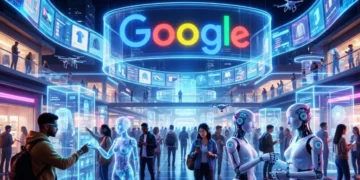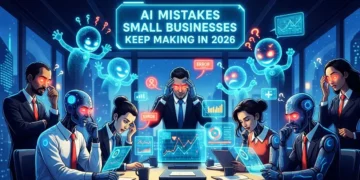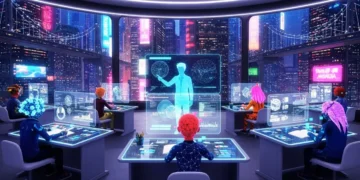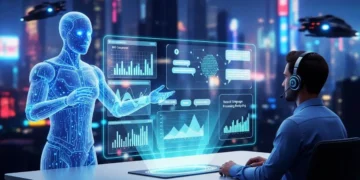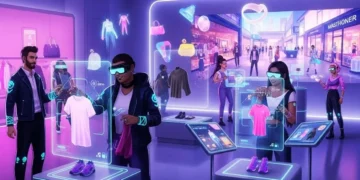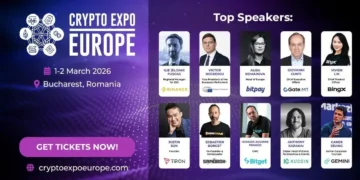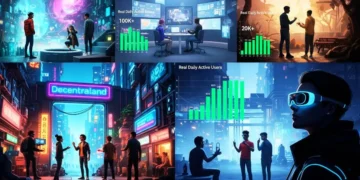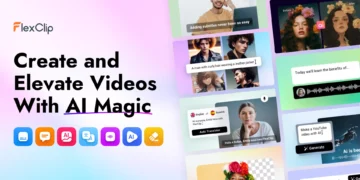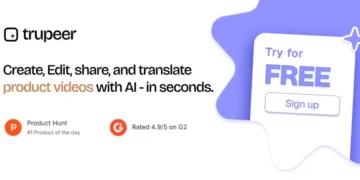Have you ever wondered why the metaverse feels so lifelike? The answer lies in artificial intelligence (AI), the silent architect of every immersive virtual experience. AI powers everything from NPCs to procedural content generation, forming the backbone of the metaverse and making it more dynamic, interactive, and engaging.
So, what exactly is the relationship between AI and the metaverse? How does it enhance user-generated content, virtual economies, and virtual events? What challenges come with this integration?
This deep dive will reveal the secret connection between AI and the metaverse by exploring real-world applications, future possibilities, and the ethical considerations shaping this digital frontier.
Have you ever wondered what makes the metaverse feel so real, responsive, and personalized? It’s not just advanced graphics or powerful servers; it’s also artificial intelligence working behind the scenes. Whether you’re exploring a virtual reality world, interacting with avatars, or participating in a digital economy, AI plays a pivotal role in shaping your experience.
The metaverse and AI are two of today’s most talked-about technologies, but their true potential lies in how they work together. In this article, we’ll explore how AI fuels the growth of the metaverse, enhances user-generated content, powers virtual events, and helps shape virtual economies. Let’s dive in.
Understanding the Core Link Between AI and the Metaverse
At its core, the metaverse is a persistent, shared, interactive digital space where users can live, work, and play. However, realizing this vision requires more than just hardware and connectivity; it also requires intelligent systems capable of processing massive amounts of data in real time.
Artificial intelligence acts as the brain behind the brawn of the metaverse. From natural language processing (NLP), which allows avatars to understand speech, to machine learning algorithms that predict user behavior and personalize experiences, AI is the invisible hand guiding the metaverse’s evolution.
Consider, for example, how user-generated content thrives on platforms like Roblox and Decentraland. Behind every creation, there’s an AI engine helping users generate realistic textures, animate characters, and moderate content. This seamless integration of AI makes these platforms accessible to everyone, not just professional developers.
Did you know? Meta (formerly Facebook) has been investing heavily in AI-driven tools to make its metaverse projects more realistic and interactive. These tools include voice cloning, emotion recognition, and gesture tracking, all of which are powered by AI.
How AI Powers the Metaverse
AI-Driven Avatars: Your Digital Twin
One of the most fascinating aspects of the metaverse is the ability to create AI-driven avatars that mimic human behavior. These avatars use natural language processing (NLP) and emotional AI to respond to your tone, mood, and speech patterns, making interactions feel incredibly realistic.
🔹 Did you know? Some avatars can now detect emotions and adjust their responses accordingly, creating a personalized metaverse experience.
Procedural Content Generation: Infinite Virtual Worlds
AI doesn’t just populate the metaverse—it builds it. Through procedural content generation, AI algorithms create vast, ever-evolving landscapes, cities, and even entire galaxies without human intervention.
🔹 Imagine: A game where no two players explore the same world. That’s the power of AI in the metaverse.
Intelligent NPCs: Beyond Scripted Interactions
Unlike traditional games with pre-programmed characters, the metaverse uses AI-powered non-player characters (NPCs) that learn from user behavior. These NPCs can act as shopkeepers, mentors, or companions and adapt their dialogue and actions in real time.
🔹 Question: Would you trust an AI NPC to guide you through a virtual economy?
AI’s Role in Virtual Economies and User-Generated Content
How AI Fuels Virtual Economies
The metaverse is more than just a playground; it’s a thriving virtual economy. AI-driven marketplaces analyze trends, set dynamic pricing, and predict demand for digital assets like NFTs.
🔹 Example: AI can suggest the best time to sell your virtual real estate based on market fluctuations.
AI and User-Generated Content
One of the biggest draws of the metaverse is user-generated content (UGC). AI tools empower creators by automating complex tasks like 3D modeling, texture generation, and even storytelling 7.
🔹 Did you know? Platforms like Meta (Facebook) are experimenting with AI-generated virtual worlds where users can build without coding skills 8.
Enhancing Virtual Events with AI
AI-Powered Virtual Concerts and Conferences
From virtual concerts to global conferences, AI enhances engagement by:
Personalizing attendee experiences (e.g., recommending sessions based on interests).
Automating translations for international audiences.
Generating real-time highlights using AI analytics 4.
🔹 Case Study: Travis Scott’s Fortnite concert used AI to create a dynamic, interactive show that adapted to player movements.
AI in Social VR Spaces
Platforms like Horizon Worlds leverage AI to:
Moderate content for safety.
Match users with like-minded communities.
Generate lifelike environments on the fly 3.
🔹 Question: Would you attend a virtual meetup hosted by an AI moderator?
Challenges of AI in the Metaverse
Privacy and Ethical Concerns
While AI enhances immersion, it also raises concerns:
Data security: How much personal data should AI collect?
Deepfake risks: Could AI avatars be misused?
Bias in AI algorithms: Will some users be excluded? 3
The Difference Between Metaverse and Generative AI
Metaverse: A persistent virtual world powered by AI, VR, and blockchain.
Generative AI: A subset of AI that creates new content (e.g., ChatGPT, DALL·E) 7.
🔹 Did you know? Generative AI is used to design metaverse assets, but they’re not the same thing.
How Meta (Facebook) Is Using AI for the Metaverse
Meta is investing heavily in AI for the metaverse, including:
AI-powered chatbots for virtual assistants.
Haptic feedback for realistic touch interactions.
Neural interfaces for mind-controlled avatars 8.
🔹 Future Prediction: Could Meta’s AI eventually predict your actions in the metaverse before you make them?
How Meta Is Using AI to Build the Future of the Metaverse
Meta Platforms Inc., the company behind Facebook, Instagram, and WhatsApp, has made significant investments in AI and the metaverse. Their goal? To build a fully immersive, interconnected digital universe where people can interact seamlessly across devices and platforms.
Key AI Initiatives by Meta
- Voicebox: A new AI model developed by Meta that can generate speech in various voices and styles. This technology is crucial for creating expressive avatars and personalized interactions in the metaverse.
- Segment Anything Model (SAM): This AI tool helps separate objects in images and videos, which is useful for editing virtual environments and integrating real-world elements into the metaverse.
- AI Avatars: Meta is developing highly customizable avatars powered by AI, capable of mimicking facial expressions and gestures in real time
These innovations show that Meta sees AI as the backbone of its metaverse ambitions. As CEO Mark Zuckerberg said, “AI is going to be a key part of making the metaverse feel alive.”
Challenges of Integrating AI in the Metaverse
While the synergy between AI and the metaverse opens up incredible possibilities, it also presents some challenges:
Ethical Concerns and Data Privacy
With AI analyzing vast amounts of personal data to personalize experiences, concerns around privacy and ethics arise. How do we ensure that users’ data is protected while still delivering intelligent, adaptive environments?
Bias in AI Models
Another issue is algorithmic bias, which can lead to unfair or discriminatory outcomes in virtual spaces. Ensuring that AI systems in the metaverse are fair, transparent, and inclusive is essential for long-term trust and adoption.
The Difference Between the Metaverse and Generative AI
You might be wondering: Is the metaverse the same as generative AI? The short answer is no — although they often work together.
- Generative AI refers to machine learning models that can create new content, such as text, images, audio, and video. Examples include ChatGPT, MidJourney, and DALL·E.
- The metaverse, on the other hand, is a collective virtual shared space created by the convergence of virtually enhanced physical reality and persistent virtual spaces.
However, when generative AI is applied within the metaverse, it unlocks powerful capabilities like automated content creation, realistic NPC behavior, and dynamic world-building. So while they are distinct concepts, their integration is reshaping how we interact with digital environments.
FAQs
What is the relationship between AI and the metaverse?
AI is the backbone of the metaverse, enabling realistic avatars, dynamic worlds, and intelligent NPCs 13.
How does AI contribute to user-generated content in the metaverse?
AI automates 3D modeling, texture creation, and storytelling, making it easier for users to build without technical skills 7.
What role can AI play in virtual economies?
AI analyzes market trends, sets dynamic pricing, and predicts demand for digital assets like NFTs 4.
How does AI enhance virtual events?
AI personalizes experiences, auto-translates languages, and generates real-time highlights 4.
Is virtual reality related to artificial intelligence?
Yes! VR relies on AI for realistic physics, NPC behavior, and adaptive environments 1.
How is Meta using AI?
Meta integrates AI for chatbots, haptic feedback, and neural interfaces in the metaverse 8.
What’s a challenge of AI in the metaverse?
Privacy risks, deepfake misuse, and AI bias are major concerns 3.
What’s the difference between the metaverse and generative AI?
The metaverse is a virtual world, while generative AI creates content (e.g., text, images).
Conclusion
The connection between AI and the metaverse is undeniable. From AI-driven avatars to self-generating virtual worlds, AI is the invisible force that brings the metaverse to life. However, with great power comes great responsibility. As we embrace this AI-powered future, we must address privacy, ethics, and inclusivity to ensure that the metaverse benefits everyone.
What’s your take? Would you trust an AI moderator in your virtual workspace? Share your thoughts below!
